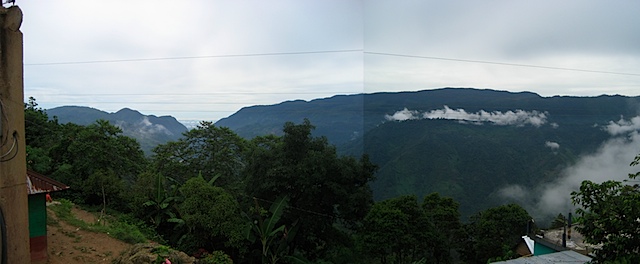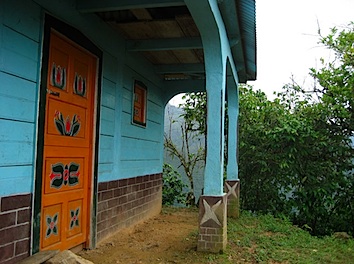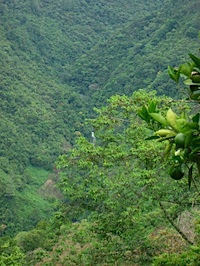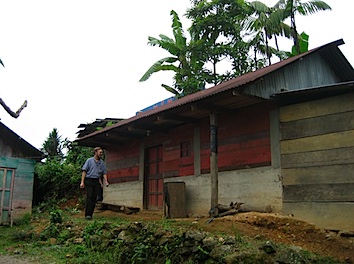Quixabaj has been an ongoing challenge for us. It’s the OTHER remote health center in our area (besides the one in our village), and the village is the most undeveloped, poor, rough place I’ve ever visited. Because it takes a grueling 4-hour pickup ride to get there, we can’t really give the villagers the support they need. So, we cooked up this plan to petition Peace Corps to get them their own volunteers. Back in April we went out there with our boss (Basilio) and the Peace Corps security director (Makali), explained the plan, evaluated the site, and we thought everything was good to go.
But then, a few weeks later, disaster struck. Basilio called our counterpart (Aurelio) and said that the PC admin had vetoed the site. Oh no! Those people NEED a volunteer! They’ve only been getting vaccinations for their babies for about 2 years, for god’s sake. To make it worse, it’s so remote that every aid organization that has ever gone there has made promises and never returned. I like to think of the Peace Corps as the bleeding edge of exterme aid workers; would we back down now, when people need us? I’m not particularly patriotic, but I feel like we’re representing the American people here, as well… could we run away from THAT? Needless to say, Emily and I were a bit annoyed. We also felt like we’d inadvertently lied to the people we’d been working with all this time.
So, we called around to various people we know in the admin, trying to figure out what happened. As I’d surmised, it was a typical bureaucratic misunderstanding. The Medical Office said that they were concerned that only pickup access was available to the site, and an obscure policy says that vounteers should avoid riding in the back of pickups because it’s unsafe. Basilio took this mean that if he sent volunteers there and they got hurt, it would be on his head. “Could the volunteers just ride in front?” I asked. “The village wants a volunteer so bad that I am sure they’d make that concession if it allowed them to get their volunteer after all.” The security guy was a big proponent of the site, because the really rural sites see the least amount of crime and are the best about caring for their volunteer (I can attest to that personally). We bugged various admin people a few more times, and the matter eventually got referred to the assistant country director.
By this time, Aurelio was getting worried. “What should I tell the leaders in Quixabaj?” he asked us. “If they don’t get their volunteer after all this, they’ll KILL me!” That was hyperbole, of course, because he’s a nice guy and brings them medicine. Nonetheless, it would be a bad situation.
“Just give us more time,” I told him. “We’re working on fixing this.”
As luck would have it, a few weeks later we heard that Quixabaj was back on the list. Makali would be coming out to visit the site one more time, to make sure that the leaders had found adequate housing for their new volunteers. I am glad we didn’t just throw our arms up and say, “Too bad; it was a nice idea while it lasted.”
What you must know about Makali the Security Director is that he himself was a Peace Corps Volunteer in Guatemala in the 90s. He really believes in the work, is enthusiastic about having more volunteers in rural areas where there is the most need, and is a big fan of “hard living”. This in mind, I gave him a call.
“What’s up?” he said.
“I hear you are coming to Quixabaj.”
“Yeah, looks like.”
“You wanna stay at my house? Are you guys allowed to do that?”
There was a pause. “Um, yeah, actually. That sounds like fun. Definitely better than the hotel,” he decided.
So I had my fifth guest ever. We ate dinnner, talked a bunch, then went to bed early for our trip to Quixabaj the following day. Luckily, he has a Peace Corps jeep, and that cuts several hours off of the trip (private Jeep goes faster than a pickup with 20 Guatemalans in the back).
This is Guatemala, though, so things never go quite like you expect them to. As we drove through Santa Eulalia the next morning, Makali noticed a gringa (white girl) standing in the town square. In my year of living in this region, I’ve only seen one other white person EVER in this municipality, so we looped back around and I hopped out to find out what the deal was.
“Um, what are.. who are… I mean, where are you going?” I asked.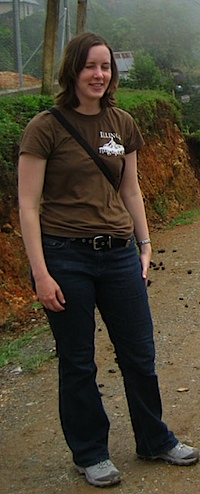
“Hey! You must the Peace Corps volunteer!” she replied.
Um, OK. What? “Yeah, that’s me. Where are you going, again?” I repeated. Turns out, she was going to the Fran-Pab, the new hotel in town, and the only one that has clean bedding, hot water, and no bedbugs. “We’re going that way. Hope in!” I said, taking some of her stuff and throwing it in the Jeep.
“Yeah, Jaime, right? And your wife is in the US and will be back in July?” she followed.
AHA! After a minute of being caught off guard, I figured it out. “Wait, you must be that linguist my buddy Pedro was talking about, that is here to study Q’anjob’al. What was it? Kathy?”
“Karen,” she said. And we were off to the hotel.
It was still early, so they weren’t answering their doorbell at the Fran-Pab. After a brief discussion, we offered to take her with us to Quixabaj. She gladly accepted; Santa Eulalia is DEAD BORING, I remember that well from a week Emily and I spent in a hotel there about a year ago. She explained that she is here for two weeks, but her project only took a few days… a big, unpleasant suprise. She was researching Mayan kinship terms (you know, words like father, brother, uncle, son-in-law, stepmother, stuff like that) and there are only about 20 in Q’anjob’al. She was expecting a lot more; some native American languages have over a hundred. So, a little sightseeing is a good thing.
Having sorted that out, we were off at last to Quixabaj. The trip went by pretty fast, as the four of us talked a lot about Q’anjob’al (she probably speaks it as well as I do, if not better) and Illinois (she’s a PhD student at U of I ) and culture. Makali is quite a talker as well, and is interested in EVERYTHING. And we spoke in Spanish the whole time, so Aurelio wouldn’t feel left out.
View from one of the houses we looked at
The meeting in Quixabaj was almost anticlimactic. Only two leaders showed up, and they were really organized (surprise!) and asked a few quick questions, then we went walking to look at the potential houses they’d lined up. Did I mention before that the Peace Corps decided to send TWO volunteers to Quixabaj? That is pretty abonormal, but everyone felt a single would go nuts in such a remote site. That, and there’s plenty of work there to keep more than one person busy. But since the new training group didn’t have any married couples this cycle, that necessitated two houses, because rural Mayans think poorly of a couple that lives in the same house but aren’t married.
House hunting for a volunteer was fun, and pleased me because it was something that we didn’t get to do for ourselves. The first house we saw was totally awesome, a cute little brightly painted house on the top of the mountain (literally) with an amazing view. Thousands of feet in the valley below, you could see a raging river with rapids (click to enlarge), and yes, those are lemons growing on the tree in the foreground. Nice. The only problem is that you have to walk a few hundred feet down the mountainside to get water. But, hey, it’s the Peace Corps, right?
The second house wasn’t as spectacular, but was still plenty nice. About the size of ours, sturdy door, leakless roof. What more could you want? That one had banana and coffee plants in the yard. The broad-leafed, tall ones are the bananas; you can even see a bunch towards the top right of the picture if you click to enlarge and look carefully. The shorter plants with the squiggly leaves are coffee. Rich, sweet coffee. Remember, Quixabaj is tierra caliente.
We chatted some with the leaders, then we headed home. My head is splitting from all the heat, sunlight, thrashing around in a jeep, and incessant talking in a foreign language. But I feel like everything is going to work out OK, and two lucky volunteers are going to get a GREAT site that I would love to have if I didn’t have the one I live in right now.
And since Karen is going to be here for a while longer, we decided she should come by for breakfast tomorrow morning. That way, she can get a break from boring Santa Eulalia, and I can talk to an American for a while (read: get a break from the locals).

